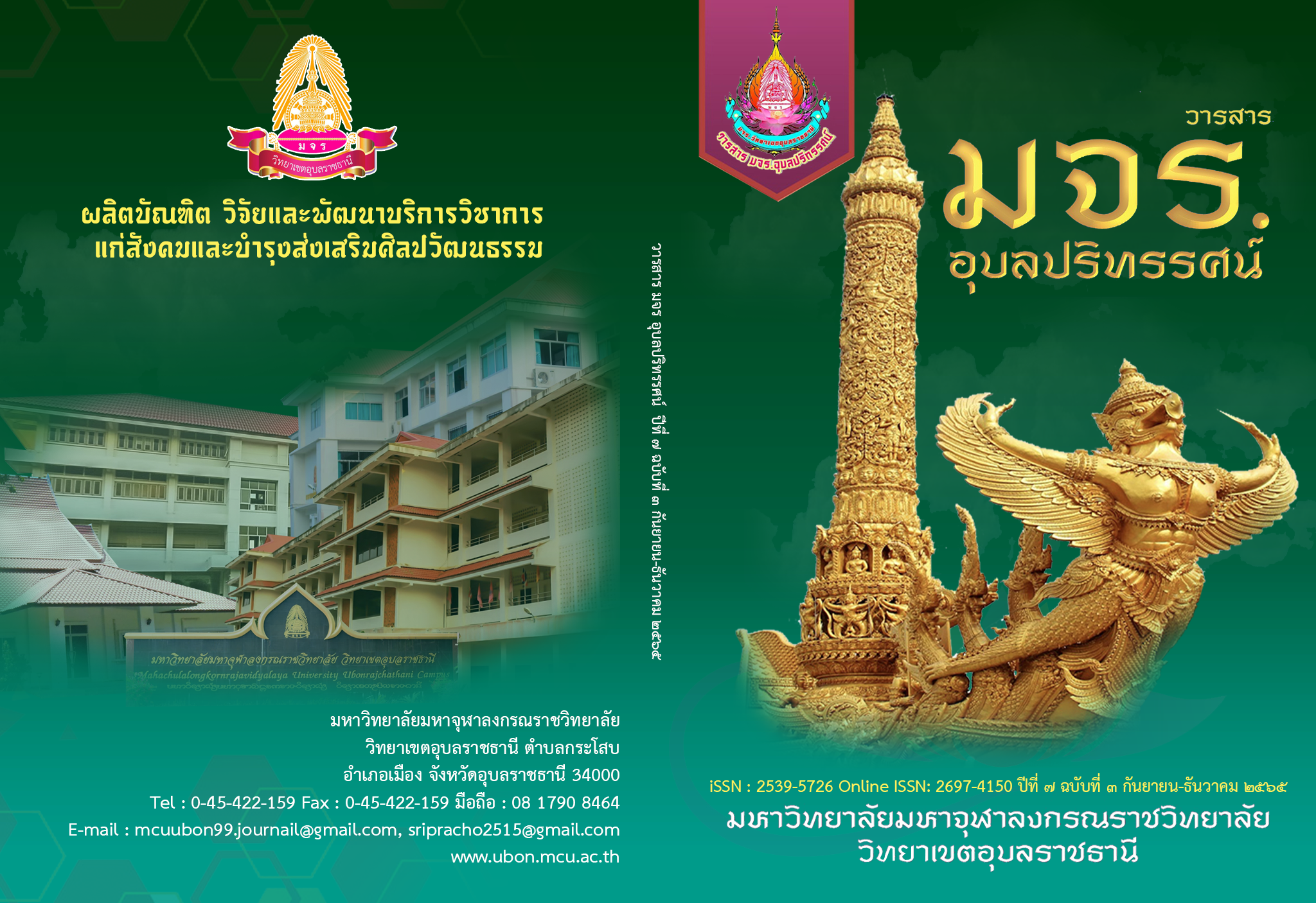การประยุกต์ใช้หลักพุทธธรรมในการพัฒนาคุณธรรมของนักเรียน โรงเรียนขุขันธ์ราษฎร์บำรุง อำเภอขุขันธ์ จังหวัดศรีสะเกษ
Main Article Content
บทคัดย่อ
บทความวิจัยนี้มีวัตถุประสงค์ 1) เพื่อศึกษาการพัฒนาคุณธรรมตามหลักพระพุทธศาสนา เถรวาท 2) เพื่อศึกษาสภาพการพัฒนาคุณธรรมของนักเรียน โรงเรียนขุขันธ์ราษฎร์บำรุง อำเภอ ขุขันธ์ จังหวัดศรีสะเกษ 3) เพื่อวิเคราะห์หลักพุทธธรรมในการพัฒนาของนักเรียนโรงเรียนขุขันธ์ราษฎร์บำรุง อำเภอขุขันธ์ จังหวัดศรีสะเกษ โดยผู้วิจัยได้ศึกษาจากกลุ่มตัวอย่าง ทั้งหมด 25 คน ประกอบด้วย กลุ่มผู้บริหารโรงเรียน ครูผู้สอน พระสอน ศีลธรรม และนักเรียนโรงเรียนขุขันธ์ราษฎร์บำรุงผลการวิจัยพบว่า 1. การพัฒนาคุณธรรม เป็นการกระทำให้ดียิ่งขึ้นหรือเจริญมากขึ้น การนำเอาหลักธรรมทางพระพุทธศาสนามาพัฒนาด้านคุณธรรมของนักเรียน ทั้งในด้านการปลูกฝั่งด้านคุณธรรมให้มีความรู้ด้านปัญญา เพื่อประโยชน์แก่ตนและสังคมซึ่งมีพื้นฐานมาจากหลักศีลธรรมทางศาสนาค่านิยม วัฒนธรรมประเพณี และวัฒนธรรมอันดีงาม 2. สภาพการพัฒนาคุณธรรม เป็นการพัฒนาให้นักเรียนมีความซื่อสัตย์ ความอดทน เคารพกฎระเบีบบ กติกา มีมารยาทและมีสติปัญญาอันดีงาม เพื่อประโยชน์แก่ตนและสังคมซึ่งมีพื้นฐานมาจากหลักศีลธรรมทางศาสนา หลักกฎหมาย จรรยาบรรณวิชาชีพ 3. การนำเอาหลักคำสั่งสอนของพระพุทธเจ้าที่ปรากฏอยู่ในคัมภีร์ และตำราทางพระพุทธศาสนา มาเป็นหลักคำสอนและข้อประพฤติปฏิบัติ ศีลธรรม กฎศีลธรรมในการพัฒนาคุณธรรมให้กับนักเรียนโรงเรียนขุขันธ์ราษฎร์บำรุง อำเภอขุขันธ์ จังหวัดศรีสะเกษ ให้มีความอ่อนน้อมเป็นมนุษย์ที่สมบูรณ์ยิ่งขึ้น
Article Details
เอกสารอ้างอิง
กัญจน์คหัฐ ปิยะกาญจน์. “วิธีการปลูกฝังคุณธรรมจริยธรรมแก่เยาวชน”. บัณฑิตวิทยาลัย : มหาวิทยาลัยธรรมศาสตร์.
ถนัด ตรัยเลิศวิเชียร. (2545). “ศิลปะการดำรงชีวิตอย่างมีความสุขตามหลักพุทธธรรม”. รายงานวิจัยมหาวิทยาลัยเกษตรศาสตร์.
นภดล เทียนเพิ่มพูน. (2546).“การปลูกฝังคุณธรรมจริยธรรมสำหรับนักเรียนนายร้อยตำรวจ”.วิทยานิพนธ์ศึกษาศาสตรมหาบัณฑิต. บัณฑิตวิทยาลัย : สถาบันราชภัฏนครปฐม.
พระดนัย อนาวิโล (บุญสาร). (2554).“การประยุกต์ใช้หลักพุทธธรรมในสถานศึกษา : กรณีศึกษา ผู้บริหารสถานศึกษาจังหวัดนครสวรรค์”. วิทยานิพนธ์พุทธศาสตรมหาบัณฑิต สาขาวิชาพระพุทธศาสนา. บัณฑิตวิทยาลัย : มหาวิทยาลัยมหาจุฬาลงกรณราชวิทยาลัย.
พระมหาไพบูลย์ วิปุโล (บุญล้ำเลิศ). (2556). “บทบาทของพระสงฆ์กับการพัฒนาจริยธรรมในโรงเรียนมัธยมศึกษา อำเภอนครชัยศรี จังหวัดนครปฐม”. วิทยานิพนธ์พุทธศาสตรมหาบัณฑิต สาขาวิชาพระพุทธศาสนา. บัณฑิตวิทยาลัย : มหาวิทยาลัยมหาจุฬาลงกรณราชวิทยาลัย.
พระมหาสมชาย สิริจนฺโท (หานนท์). (2547). “พุทธธรรมเพื่อการพัฒนาคุณภาพชีวิตตามแนวทางของพระเทพวรคุณ (สมาน สุเมโธ)”. วิทยานิพนธ์พุทธศาสตรมหาบัณฑิต สาขาวิชาพระพุทธศาสนา. บัณฑิตวิทยาลัย : มหาวิทยาลัยมหาจุฬาลงกรณราชวิทยาลัย.
พระมหาเสกสรร จิรภาโส (จี้แสง). (2552). “การศึกษาวิเคราะห์หลักไตรสิกขาที่มีต่อการจัดการศึกษา ไทย”, วิทยานิพนธ์พุทธศาสตรมหาบัณฑิต สาขาวิชาพระพุทธศาสนา. บัณฑิตวิทยาลัย : มหาวิทยาลัยมหาจุฬาลงกรณราชวิทยาลัย.
ศกวรรณ ทัพภะพยัคฆ์. (2546). “การปลูกฝังความรู้และคุณธรรมทางพระพุทธศาสนาของนักเรียนชั้นประถมศึกษา : ศึกษาเฉพาะกรณี กลุ่มโรงเรียนประถมศึกษา ชั้นปีที่ 5-6 อำเภอบางกรวย จังหวัดนนทบุรี”, วิทยานิพนธ์พุทธศาสตรมหาบัณฑิต สาขาวิชาพระพุทธศาสนา. บัณฑิตวิทยาลัย : มหาวิทยาลัยมหาจุฬาลงกรณราชวิทยาลัย.
สังคม สมฤทธิ์. (2552). “การบริหารงานวิชาการของโรงเรียนซางวิทยาคม อำเภอภูซาง จังหวัดพะเยา”. วิทยานิพนธ์ครุศาสตรมหาบัณฑิต สาขาวิชาการบริหารการศึกษา. บัณฑิตวิทยาลัย : มหาวิทยาลัยราชภัฎเชียงราย.
สุทธิวงศ์ ตันตยาพิศาลสุทธ์. (2538). พระพุทธศาสนากับการศึกษาของชาติ. กรุงเทพฯ: โรงพิมพ์การศาสนา.
สุภาพรรณ ณ บางช้าง. (2526). “พระสงฆ์กับการพัฒนาชนบทในการแสวงหาเส้นทำงานการพัฒนาชนบทของพระสงฆ์ไทย”. กรุงเทพฯ : กองแผนงานกรมการศาสนากระทรวงศึกษาธิการ.


